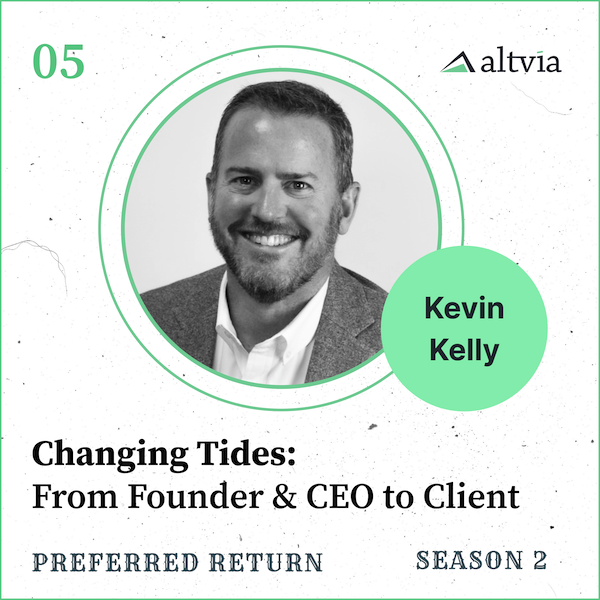Preferred Return Podcast
Changing Tides: From Founder & CEO to Client
ABOUT THE EPISODE
Welcome back to Altvia’s Preferred Return Podcast! In this episode, our host and Chief Strategy Officer, Jeff Williams, sits down with Kevin Kelly, Altvia’s founder and former CEO, to discuss the importance of understanding data and technology and how to transform that knowledge into premium solutions for the private capital market.
Jeff and Kevin’s relationship dates back to 2007, where they bonded over technology, data, and innovation for the private capital market. Tune into the episode to hear Kevin and Jeff reminisce about their relationship, Kevin’s transition from CEO to client, and their shared journey of building Altvia into the company that it is today.
ABOUT THE EPISODE
Welcome back to Altvia’s Preferred Return Podcast! In this episode, our host and Chief Strategy Officer, Jeff Williams, sits down with Kevin Kelly, Altvia’s founder and former CEO, to discuss the importance of understanding data and technology and how to transform that knowledge into premium solutions for the private capital market.
Jeff and Kevin’s relationship dates back to 2010, where they bonded over technology, data, and innovation for the private capital market. Tune into the episode to hear Kevin and Jeff reminisce about their relationship, Kevin’s transition from CEO to client, and their shared journey of building Altvia into the company that it is today.
MENTIONED CONTENT
COMPANIES
TRANSCRIPT
[00:00:00] Jeff Williams: Kevin Kelly, welcome to Preferred Return. I’ve said this a couple times on recent episodes with recent guests. Been a long time coming. This one has been the longest time coming. You happen to be here in the Altvia office today, this is not like the first time you’ve been back.
[00:00:23] Welcome. I wonder when you’re not here, and then I see you hear what it’s like to be here. What do you feel when you’re back here?
[00:00:31] Kevin Kelly: Yeah, first off, thanks. It’s an honor to be be on the podcast and it’s really cool to see what you’ve been able to build here over the last couple years.
[00:00:39] But yeah, coming back here it’s oddly familiar. It doesn’t feel any different to me at all. It’s like the same place with different people, different faces that changes and evolves and it’s been really interesting to me that it’s never felt like, a big homecoming or I’m coming home.
[00:00:56] It just feels the same as it always did. And I think that, one of the things that was really important to me and really our whole leadership team and you were and are still part of the leadership team is, creating a space that kind of had energy.
[00:01:07] And you can definitely feel the energy when you come in here and it’s really cool. And I also think that just the wide open nature of it and being able to come in and see everyone that’s here and it’s cool to see coming out of Covid. There’s definitely more and more activity thats happening here.
[00:01:19] And that activity happens when people are here together and bumping into each other. And, over the last, I guess it’ll be almost two years since I since I officially stepped back. And it definitely seems like there’s an uptick in people coming into the office at least overlapping when I’m here.
[00:01:33] So it’s exciting to see.
[00:01:35] Jeff Williams: It’s cool to have you back. I get the benefit of I get to talk about you a lot with new employees and telling the story and stuff and and then it’s really cool cuz then sometimes you’re just here and they’re here and, almost like all starstruck and I get to introduce you and be like, it’s just Kevin, which doesn’t suggest you’re any less of a star to me than you are to them.
[00:01:52] On that note, I think, was it probably, I was trying to recall back, rewind the tape, 2007, 2008 perhaps, when you and I first met somewhere in that neighborhood.
[00:02:04] Kevin Kelly: I think it was probably 2008, I think. Yeah. I could probably go back and look. I love, that’s one of the things I love.
[00:02:09] This world of everything gets put into our calendars, as you can go back and look at that stuff. Although, I don’t know if we were on Google Calendar at that point, but yeah, it was either 2007 or 2008, and I recall coming to the to the Greenspring offices in Owings Mills, Maryland, and in media at that time. And yeah, it was it was clear, we were kindred spirits in a way, I think not only with the Colorado connection, but just being interested in this stuff. And yeah, I remember just probably both of us af after we first met, just coming up with like little reasons to keep in touch with each other.
